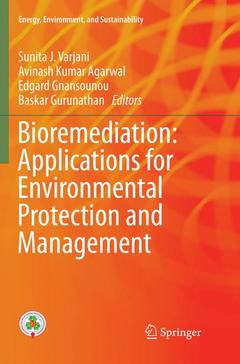Description
Bioremediation: Applications for Environmental Protection and Management, 1st ed. 2018
Energy, Environment, and Sustainability Series
Coordinators: Varjani Sunita J., Agarwal Avinash Kumar, Gnansounou Edgard, Gurunathan Baskar
Language: English
Subjects for Bioremediation: Applications for Environmental...:
Publication date: 12-2018
Support: Print on demand
Publication date: 01-2018
Support: Print on demand
Description
/li>Contents
/li>Biography
/li>Comment
/li>
This book examines bioremediation technologies as a tool for environmental protection and management. It provides global perspectives on recent advances in the bioremediation of various environmental pollutants. Topics covered include comparative analysis of bio-gas electrification from anaerobic digesters, mathematical modeling in bioremediation, the evaluation of next-generation sequencing technologies for environmental monitoring in wastewater abatement; and the impact of diverse wastewater remediation techniques such as the use of nanofibers, microbes and genetically modified organisms; bioelectrochemical treatment; phytoremediation; and biosorption strategies. The book is targeted at scientists and researchers working in the field of bioremediation.
Dr. Sunita Varjani is a Scientific Officer at the Gujarat Pollution Control Board, India. She holds an M.Sc. degree in Microbiology (2009) and a Ph.D. in Biotechnology (2014). Her major areas of research are Industrial and Environmental Microbiology/Biotechnology and Molecular Biology. Dr. Varjani has authored 35 publications, including one book, 19 book chapters/reviews and 15 original research papers. She has received several awards and honours, including the Young Scientist Award at the AFRO-ASIAN Congress on Microbes for Human and Environmental Health, New Delhi (2014) and Best Paper Awards for oral presentations at national and international conferences in 2008, 2012 and 2013. Further, she serves on the editorial board of the Journal of Energy and Environmental Sustainability.
Prof. Avinash K. Agarwal joined the IIT Kanpur in 2001. His areas of interest are IC engines, combustion, alternative fuels, conventional fuels, optical diagnostics, laser ignition, HCCI, emission and particulate control, and large-bore engines. He has published 230+ international journal and conference papers. Prof. Agarwal is a Fellow of the SAE (2012), ASME (2013), ISEES (2015) and INAE (2015). He has received several awards such as the prestigious Shanti Swarup Bhatnagar Award in Engineering Sciences-2016; Rajib Goyal prize-2015; NASI-Reliance Industries Platinum Jubilee Award-2012; and INAE Silver Jubilee Young Engineer Award-2012.
Dr. Edgard Gnansounou is a Professor of Modelling and Planning of Energy Systems at the Swiss Federal Institute of Technology Lausanne (EPFL), Switzerland, where he is the Director of the Bioenergy and Energy Planning Research Group. His current research work focuses on techno-economic and environmental assessment of bio-refinery schemes based on the conversion of agricultural residues. He is leading research projects in this field in several countries including Brazil, Colombia and South Africa. In addi



